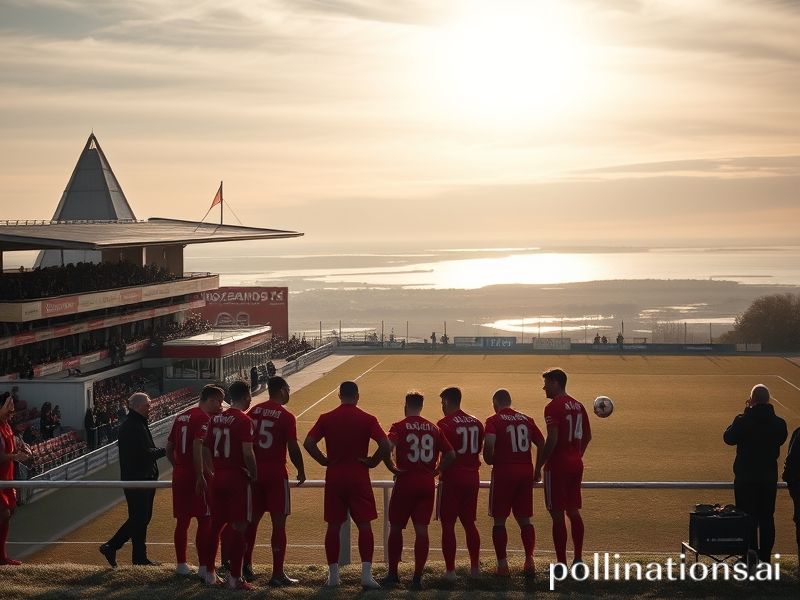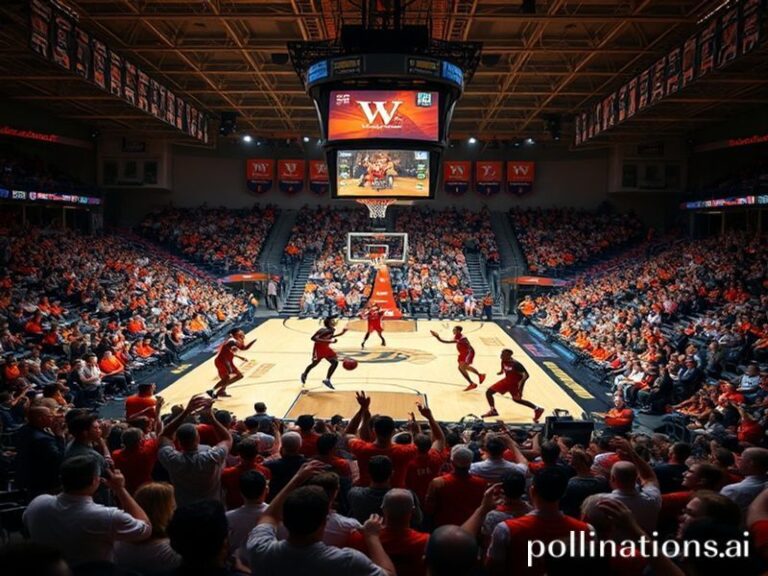Morecambe FC: The Shrimp-Sized Club Teaching the World to Laugh at Oblivion
Morecambe FC: The Tiny Club Teaching the World How to Lose Beautifully
By Dave’s Locker Foreign Correspondent-at-Large
In the grand geopolitical casino, where superpowers bluff with nukes and billionaires buy elections between Zoom calls, Morecambe Football Club is the one player who keeps pushing all-in with pocket deuces and a grin. The Shrimpers—yes, named after the crustacean that most of humanity devours with butter—sit on England’s northwest coast like an inside joke the universe forgot to explain to the rest of the planet. Their home ground, the Mazuma Stadium, sounds suspiciously like a payday-loan app and holds roughly 6,500 souls, or about half the population that claims to have “always supported Real Madrid.”
Globally, this should register somewhere between a rounding error and a TikTok trend. Yet Morecambe’s stubborn refusal to be quietly relegated from the English Football League is becoming a transnational allegory for every small nation, island state, and overlooked province currently being told by the IMF to “tighten its belt.” When the club somehow survived League Two in 2021—partly because a defender’s clearance ricocheted off a seagull and looped into the net—it triggered a wave of schadenfreude so pure that diplomats in Brussels circulated the clip as evidence that cosmic justice occasionally outranks VAR.
The international significance, if we squint hard enough through the coastal drizzle, is bleakly inspirational. Morecambe’s annual budget is reportedly smaller than what Paris Saint-Germain spends on deodorant. Their scouting network once unearthed a striker from the local ferry timetable. And yet they persist, like Greece arguing about marble statues or Canada apologizing for existing. In a world where soft power is measured by Netflix budgets and Olympic medal tables, Morecambe offers a refreshing counter-metric: the ability to disappoint without destabilizing currency markets.
Economists in Luxembourg have begun citing “The Morecambe Principle”—the theory that consistent underdog survival lowers regional cortisol levels. Meanwhile, hedge-fund analysts in Connecticut model the club as a volatility hedge: when Morecambe wins, emerging-market bonds rally on the assumption that miracles remain marginally possible. A junior quant at Goldman has already pitched a synthetic CDO called ShrimpSwap, though HR asked him to take a wellness week.
There is, of course, the existential subplot: climate change. Morecambe Bay is projected to reclaim the pitch sometime around 2080, turning the stadium into a tasteful artificial reef. The club’s response has been quintessentially British: a commemorative third kit made from recycled fishing nets and a polite letter to the ocean requesting it wait until after the January transfer window. UNESCO is watching closely; nothing says “heritage in danger” like a club shop selling snorkels alongside scarves.
The cultural soft-power play is subtler. When a Singaporean fan account live-tweets Morecambe matches in Mandarin at 3 a.m. local time, it’s hard to tell whether this is genuine devotion or post-ironic performance art. Either way, the club now has a Burmese-language podcast (“Shrimpin’ Ain’t Easy”) and a supporters’ group in Reykjavik that meets monthly to drink Brennivín and complain about the wind. Somewhere in the metaverse, a DAO is minting NFTs of the seagull goal, with proceeds allegedly earmarked for a floating stand once the tide comes in.
As COP delegates argue over carbon credits, and the World Bank wrings its institutional hands, Morecambe FC keeps kicking its fluorescent ball toward an indifferent horizon. They will probably lose again on Saturday—statistics are cruel but honest mistresses—and yet the loss will be celebrated in at least twelve time zones as proof that entropy can be charming if properly marketed.
In conclusion, the broader significance of Morecambe is not that they win; it’s that they haven’t yet been fully swallowed by the churning machinery of global capital or the actual sea. Their continued existence is a quiet, salty rebuttal to every algorithm predicting inevitable collapse. The world may be ending, but first, there’s injury time—and possibly extra seagulls.







